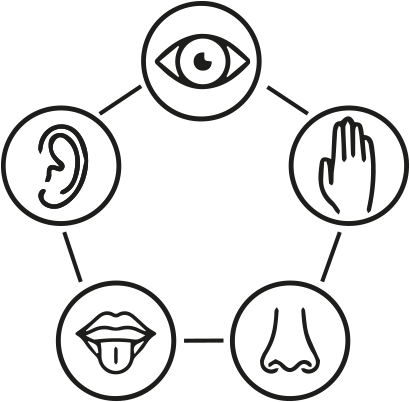Altman Seminar: Sensory Knowledge
| Altman Seminar: Sensory Knowledge
Miami University Led by:
|
| Intended learning outcomes (more on programme level)
In seminar discussions, we will consider the traditional model of the five senses and contemporary society’s altered modalities of sense perception. We will think about what is lost or found in the move inward into technologies and devices and ask what are the broader consequences for humanity as well as literary and artist representation in the changing sensorial landscape? |
Learning objectives (course specific)
|
| Objective statement (course description)
Nothing is more essential to human experience than sensation. We see, hear, taste, touch, and feel the world around us. Or do we? Enduring works of philosophy, history, literature, film, and criticism suggest that our sensory engagements are far more complex than they seem. In the current age of growing detachment from the body, devices increasingly mediate sensation. These developments have ignited a scholarly return to the question of the senses across a variety of disciplinary fields from the arts and humanities to the cognitive sciences. This seminar will explore the philosophical and historical foundations of sensory experience and will examine how sensory modes inform literary and artistic expression and how the senses connect, interpret, determine, and sometimes disconnect us from the world of representation. In seminar discussions, we will consider the traditional model of the five senses and contemporary society’s altered modalities of sense perception. We will think about what is lost or found in the move inward into technologies and devices and ask what are the broader consequences for humanity as well as literary and artist representation in the changing sensorial landscape? All students enrolled in the seminar are a part of a special year-long Humanities Center interdisciplinary research program called the Altman program. You will have the opportunity to attend public lectures by distinguished artists, intellectuals, and cultural critics and extend our conversation about the senses outside of the classroom. Course readings and viewing will include a broad range of interdisciplinary materials from secondary texts in philosophy and cultural history (Aristotle, Classen, Howes, Jütte, Benjamin, Merleau-Ponty, and Rancière among others) as well as a selection of primary sources that will include novels, plays, short stories, films, animated features, and digital installations (Cervantes, Zayas, Poe, Ocampo, Balzac, Schnabel, Kieslowski, Jonze, Olde Wolbers, etc.). |
| Type of course
Content course |
| Target group
University students |
Pedagogical approach
|
| Activities/syllabus
Course Syllabus
Readings: Aristotle, On the Senses, Books II-III; Sense and Sensibilia Session 1: Foundations of Sensory Experience
Readings: Robert Jütte, A History of the Senses, chs. 1-3 Daniel Heller-Roazen, The Inner Touch, chs. 1-2
David Howes, “Introduction: Empire of the Senses”; Susan Stewart, “Prologue: From the Museum of Touch”; Constance Classen, “The Witch’s Senses: Sensory Ideologies and Transgressive Femininities from the Renaissance to Modernity” Altman Lecture: David Howes, “The Evidence of the Senses”
Readings: Miguel de Cervantes, Don Quijote (selections in English) Steven Wagschal, “The Smellscape of Don Quixote: A Cognitive Approach” Charles Ganelin, “Don Quixote as Museum”
Readings: María de Zayas: Tale 5, “Innocence Punished,” from The Disenchantments of Love (Optional) Heather Young, ch. 6 “María de Zayas and the Fragrance of a Woman’s Space” (Optional) Lisa Vollendorf, “Fleshing Out Feminism in Early Modern Spain: María de Zayas’s Corporeal Politics”
Readings: Michel de Montaigne “Of Smells” (1580) René Descartes, Dioptrique (1637) Daniel Heller-Roazen, The Inner Touch, “Perception Everywhere”, ch. 3
Readings: Maurice Merleau-Ponty, “Eye and Mind” Section 2: Sensing Difference: Visual, Fictional, Real
Readings: Sigmund Freud “The Uncanny” Edgar Allen Poe: “The Tell-tale Heart” and “The Pit and the Pendulum”
Readings: Emilia Pardo Bazán, “Torn Lace”; Horacio Quiroga, “The Dead Man”
Readings: David Bordwell, Glossary of Film Terms from Film Art Vivian Sobchack, Carnal Thoughts (excerpt, tbd) Viewings: Spike Jonze “Her” (2013)
Readings: Donald Ihde, “Inner Speech” Listening and Voice
Readings: Joseph Kickasola, “Kieslowski’s Musique concrete” Viewing: Krzysztof Kieslowski, The Double Life of Veronica (1991)
Readings: Laura Marks, “Thinking Multisensory Culture” (Optional) Georgina Evans, “Imagination and the Senses” Viewing: Krzysztof Kieslowski, Blue (1993) Section 3: Theater(s) of the Sensual
Readings: Carolyn Korsmeyer, Making Sense of Taste, chs. 1 and 4; Viewings: Gabriel Axel, Babette’s Feast (1987)
Readings: Carolyn Korsmeyer, “Touch and the Experience of the Genuine”; “The Wreckage of Time and the Persistence of Things: Preserving the Value of Genuineness” Altman Lecture: Carolyn Korsmeyer “Tasting the Past” (Optional) – Pouring Tea “In the Next Room”, Patterson Place 4-6pm **Interactive salon discussion with cast of Miami University’s production of In the Next Room about the history of Victorian ideals, scientific innovation, and cultural practice over tea and snacks
Readings: Sarah Ruhl, In the Next Room Michel Foucault, “We, ‘Other Victorians’” The History of Sexuality, Vol. 1
Readings: Michel Foucault, “The Repressive Hypothesis” The History of Sexuality, Vol. 1. Gates Abegglen Theater (Miami U), Sarah Ruhl, In the Next Room **Attend performance of Sarah Ruhl’s play and participate in talkback with dramaturgs Section 4: Contemporary Ways to Sense
Readings: Francis Ponge, The Nature of Things Jane Bennett, “The Force of Things” Vibrant Matter
Readings: Laura Marks “Preface,” The Skin of the Film Tarja Laine, “The Diving Bell and the Butterfly as Emotional Event” Viewings: Julian Schnabel, “Diving Bell & the Butterfly” (2007) Altman Lecture: Margaret Livingstone “What Art Can Tell Us about the Brain”
Readings: Silvina Ocampo, “The Velvet Dress,” “Isis” (“Mimoso,” “Lovers,” “The Expiation,” and “Sheets of Earth” included as suggested readings by Ocampo.)
Readings: Roland Barthes, Camera Lucida, part one Honoré de Balzac, Unknown Masterpiece
Readings: Borges, “The Ethnographer”; Roland Barthes, Camera Lucida, part two Altman Lecture: Steven Matijcio “Making Sense in, and of, Contemporary Art”
Readings: Saskia Olde Wolbers, Screenplays for short films (via email attachment) Viewing: Saskia Olde Wolbers, “Trailer,” “Placebo,” and “Pareidolia” |
| Assessment of learning
Evaluation:
|
| Effect (witness account, evaluation of the course) |
| Additional biblio sources
Books:
|
